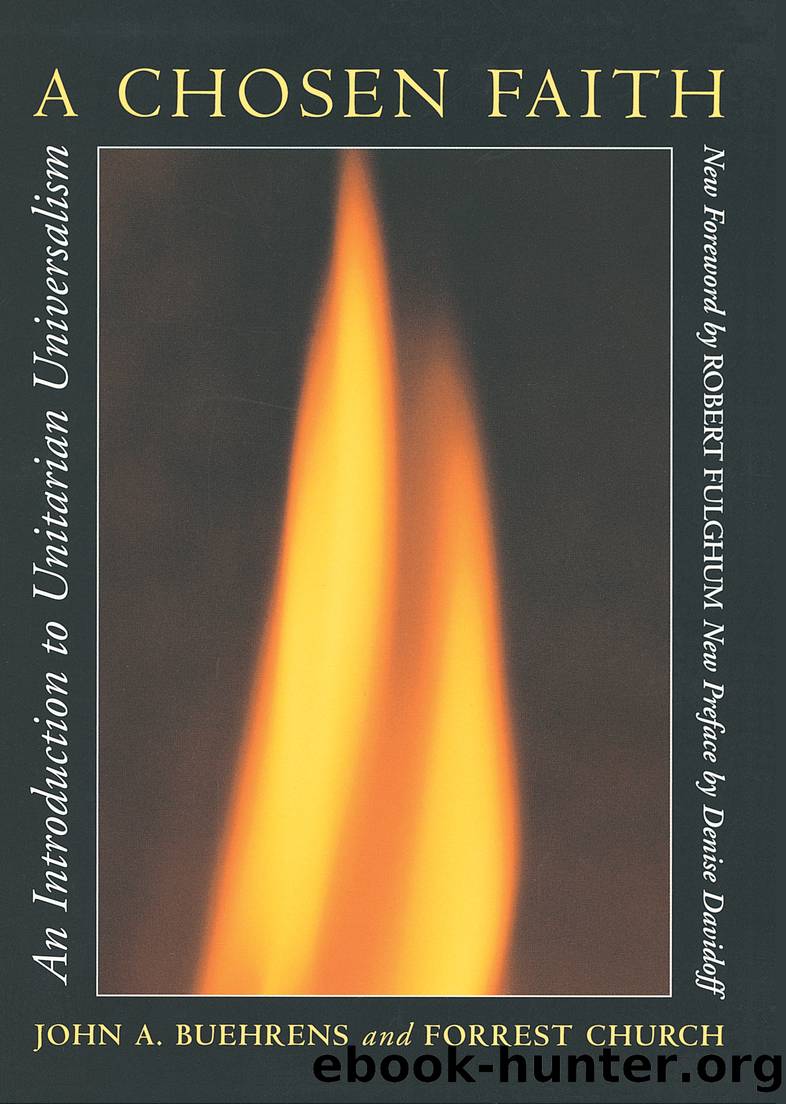A Chosen Faith by John A. Buehrens

Author:John A. Buehrens
Language: eng
Format: epub
Publisher: Beacon Press
Published: 2010-01-15T00:00:00+00:00
PART 4
Jewish and Christian teachings which call us to respond to Godâs love by loving our neighbors as ourselves.
7
Neighborhood
Forrest Church
A rabbi spoke with God about heaven and hell. âI will show you hell,â God said, and they went into a room which had a large pot of stew in the middle. The smell was delicious, but around the pot sat people who were famished and desperate. All were holding spoons with very long handles which reached to the pot, but because the handles of the spoons were longer than their arms, it was impossible to get the stew back into their mouths. âNow I will show you heaven,â God said, and they went into an identical room. There was a similar pot of stew, and the people had identical spoons, but they were well nourished and happy. âItâs simple,â God said. âYou see, they have learned to feed one another.â
âMedieval Jewish story
Jesus is a multidimensional figure. He stands in the prophetic line of Judaism, and for those who would be his followers, he opens up the rich tradition of the Hebrew Scriptures.⦠The words and deeds of Jesus recorded in the New Testament provide the blueprint for human fulfillment. Jesus calls us to comfort and sustain one another, to lift the burdens of the oppressed, and to serve God with joy.
âJudith L. Hoehler, Unitarian Universalist minister
IN HIS NOVEL The Europeans, Henry James describes an English baronessâs first visit to the house of her American cousins in Boston:
Her glance fell upon young Mr. Brand, who stood there with his arms folded and his hands on his chin, looking at her.
âThe Gentleman, I suppose, is a sort of ecclesiastic,â she said to Mr. Wentworth, lowering her voice a little.
âHe is a minister,â answered Mr. Wentworth.
âA Protestant?â asked Eugenia.
âI am a Unitarian, Madam,â replied Mr. Brand, impressively.
âAh, I see,â said Eugenia. âSomething new.â
Mr. Brand is clearly a bit of a stick. He would have benefitted from G. K. Chestertonâs reminder, âAngels can fly because they take themselves lightly.â A great defender of orthodoxy, Chesterton also insistently pointed out that when it comes to religion novelty is not a particularly strong credential; as often as not, it suggests shortsightedness, impermanence, and faddishness.
On the other hand, hidebound religions, dogmatically fixed to some ancient creed formulated centuries ago in response to theological, political, and sociological conditions of another age and culture, escape the dangers of novelty, but at an unacceptable price. In the 1920s neo-orthodox theologian Karl Barth argued that revelation (the action of the Holy Spirit) was restricted to the sixty-mile stretch between Jerusalem and the Sea of Galilee, and further confined to the short thirty-odd years of Jesusâ life. Not only did Barth hold that revelation was sealed from then on, but also that the ancient scriptures preparing for and chronicling the revelation of Jesus Christ constitute our only way to understand the meaning of life and death. Despite the âneo-â in its moniker, there was nothing particularly novel in this point of view.
Download
This site does not store any files on its server. We only index and link to content provided by other sites. Please contact the content providers to delete copyright contents if any and email us, we'll remove relevant links or contents immediately.
| Baha'i | Cults |
| Demonology & Satanism | Eckankar |
| Egyptian Book of the Dead | Freemasonry |
| Messianic Judaism | Mysticism |
| Scientology | Theism |
| Tribal & Ethnic | Unitarian Universalism |
The Four Agreements by Don Miguel Ruiz(6745)
Breaking Free by Rachel Jeffs(4216)
The Hatha Yoga Pradipika (Translated) by Svatmarama(3329)
120 Days of Sodom by Marquis de Sade(3264)
Member of the Family by Dianne Lake(2352)
The Tao of Physics by Fritjof Capra(2272)
The Psychedelic Gospels: The Secret History of Hallucinogens in Christianity by Jerry B. Brown(2156)
The Road to Jonestown by Jeff Guinn(2063)
Going Clear: Scientology, Hollywood, and the Prison of Belief by Lawrence Wright(1981)
Going Clear by Lawrence Wright(1963)
Uriel's Machine by Christopher Knight(1898)
The Grand Grimoire: The Red Dragon by Author Unknown(1807)
The Gnostic Gospel of St. Thomas by Tau Malachi(1794)
Key to the Sacred Pattern: The Untold Story of Rennes-le-Chateau by Henry Lincoln(1630)
Animal Speak by Ted Andrews(1619)
The Malloreon: Book 02 - King of the Murgos by David Eddings(1589)
Waco by David Thibodeau & Leon Whiteson & Aviva Layton(1558)
The New World Order Book by Nick Redfern(1548)
The Secret History of Freemasonry by Paul Naudon(1492)
